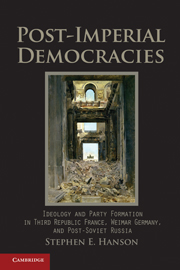 Post-Imperial Democracies
Post-Imperial Democracies Book contents
1 - Weberian Methodological Individualism
Published online by Cambridge University Press: 05 June 2012
Summary
It might seem odd to devote an entire chapter of a book on the origin and causal impact of ideologies to an analysis of Max Weber's political sociology. After all, Weber is one of the acknowledged giants of classic social theory whose work has been ritualistically cited by social scientists for more than a century. One might assume that, by now, Weber's key concepts and definitions would be so widely understood as to render a detailed account of them superfluous. Remarkably, however, this is far from being the case. Indeed, as this chapter helps to demonstrate, Weber is almost certainly the most commonly misinterpreted theorist in the history of social science.
To correct such misinterpretations is a lonely task. Despite near-universal acknowledgment of Weber's intellectual genius, self-described Weberians form a distinct minority of contemporary Western social scientists. Among political scientists, in particular, only a tiny handful of scholars embraces a self-consciously Weberian paradigmatic approach. Nor is this result due simply to the length of time elapsed since Weber's day. In fact, most social scientists continue to profess allegiance to competing social science paradigms also developed in the nineteenth century: Marxism, Parsonian modernization theory (rooted in the works of Emile Durkheim), and the neoclassical economic approach to social scientific analysis (initially derived from Adam Smith) that is now called rational choice theory. The academic marginalization of Weberian analysis is thus a striking intellectual puzzle.
- Type
- Chapter
- Information
- Post-Imperial DemocraciesIdeology and Party Formation in Third Republic France, Weimar Germany, and Post-Soviet Russia, pp. 3 - 28Publisher: Cambridge University PressPrint publication year: 2010


